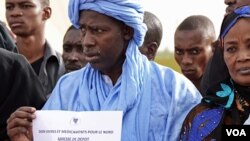In Bamako on Sunday, scores of people gathered at a monument where youths held up signs with information about where Malians can drop donations.
Led by Almahady Cissé, the group is preparing to send food, clothing, medicines and other supplies as part of a so-called "solidarity chain" of support for fellow Malians in the north. They're talking with local transport companies and NGOs about logistics for a humanitarian caravan that would pick up contributions in cities along the way, and Cisse says they plan to continue their sit-in until the first load is sent.
But they know it won't be easy. Last week, Tuareg rebels and Islamic militants swept into northern Mali’s three major cities - Kidal, Gao and Timbuktu - looting hospitals, markets, shops, NGO warehouses and even private homes along the way.
Gao, reportedly the hardest hit by looting, has been the logistical hub for aid agencies serving the north.
While many northerners were able to flee by truck, bus and pirogue, the situation remains dire for those left behind.
Insecurity still an obstacle
For Bamako-based benefactors as well as international NGOs, insecurity remains a big constraint on planned aid shipments.
"The [Northern] territory is now controlled by Tuareg rebels and other armed groups," said former Timbuktu resident Abdoulaye Soumaïla Maïga, explaining that the situation may remain too risky to send an aid convoy. "We will not force things, but we must appeal to these groups so that aid can reach the people."
It is critical, he says, that initial aid shipments are delivered by fellow citizens.
"We want to show to the entire world that Malians can count on Malians for help," said Maïga. "Before any other assistance, the first must come from us. And we want our brothers and sisters in the north to know that the independence of a separate state announced by Tuareg rebels is not the reality - we remain a united Mali."
ECOWAS mulls troop deployments
Although the Economic Community of West African States (ECOWAS) is discussing possible troop deployments in northern Mali, Abdourahamane Touré, part of an association of northern natives, says that even if such a force could provide some stability for aid corridors, help must start moving now.
"For now it’s the responsibility of the armed groups occupying the north to create safe corridors for aid to get in," he said. "The time it will take for any international force to mobilize, many in the north would not survive the wait."
But Michel-Olivier Lacharité, Mali program manager for Doctors Without Borders, one of the aid agencies still present in the north, points to two other primary obstacles.
"It’s very difficult to go everywhere we want and ensure a good space of work," said Lacharité. "And the second one is the accessibility to the population because they are scattered, or a lot of them moved out of the country."
Unrest has severely disrupted economic activities in the north, he says, and these new difficulties come at the beginning of the lean season.
According to Olivier Vandecasteele of Doctors of the World-Belgium in Mali, one of the few medical aid groups remaining in the north, some primary health care and nutrition screening is being provided. But, Vandecasteele warns, aid isn't arriving quickly enough.
"It’s really too little and currently too late," he said. "In the capital, basically everybody is reshuffling their cards and seeing how they can avoid such security incidents and try to regain some access, but this takes a long time once you’ve lost your operational capacity. I believe it will be still quite late, seeing the really difficult [current] isolation of populations of north Mali."
Some transit lines running
For those clamoring to flee northern cities despite the security risk, some Bamako transport companies are sending buses.
Dramane Traoré, commercial director with Bani Transport - one of the bus companies with regular lines between Bamako and Gao - service was briefly interrupted after the attacks.
"People in the north are suffering so we decided to take the chance to resume buses to Gao," he said. "We cannot abandon the population - this is our country, these are our people. There are no passengers for Bamako to Gao, but we fill up the tanks [and] make the trip to help those who want to get out."
News
Malians Organize Aid Despite Odds
- By Nancy Palus









